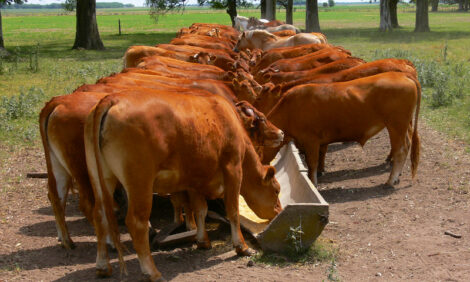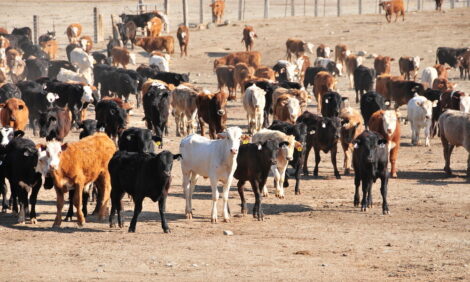



Live cattle futures end mostly lower - CME
Hog futures climbChicago Mercantile Exchange (CME) live cattle futures closed mostly lower on Monday on technical selling and worries about consumer demand for high-priced cuts of beef, reported Reuters, citing traders.
Most-active CME February live cattle futures settled down 0.700 cent at 152.550 cents per lb. Deferred contracts also ended lower, but the spot December contract eked out a higher close, up 0.050 cent at 151.575 cents per lb.
Wholesale beef prices declined, with choice cuts down another 96 cents at $257.98 per hundredweight (cwt) on Monday afternoon after tumbling more than $4 per cwt on Friday, according to US Department of Agriculture (USDA) data.
"The (USDA's) Cattle on Feed report on Friday probably is going to tell us we are in a cyclical bull market, but that is long-term. In the short term, there is still a question mark with the economy," said Ron Roose, president of Iowa-based US Commodities.
Still, CME feeder cattle futures ended higher, with January feeders rising 0.875 cent to settle at 179.450 cents per lb as corn futures drifted lower, signalling cheaper feed costs.
Hog futures closed higher, boosted in part by optimism about pork demand from China. The Asian nation is set to increase pork imports in the coming months, industry participants said, after losses for farmers in China last year caused a reduction in hog output that appears larger than official data suggests.
"We all need to watch China; we expect increased sales due to their pork shortfall," said Jim Long, chief executive at Canada's Genesus Inc, a supplier of breeding pigs to China, in a note last week.
CME December lean hog futures settled up 0.525 cent at 84.875 cents per lb, with February hogs up 0.575 cent at 88.975 cents.
In other livestock news, shares of Tyson Foods Inc slumped 2% after the US meat processor said declining demand for pork and premium beef contributed to lower-than-expected quarterly earnings.
Argentina's government said Saturday that Mexican authorities have given the green light for imports of Argentine boneless beef. The announcement came after eight years of negotiations between the two countries and more than a decade since Mexico last imported these cuts from Argentina.



